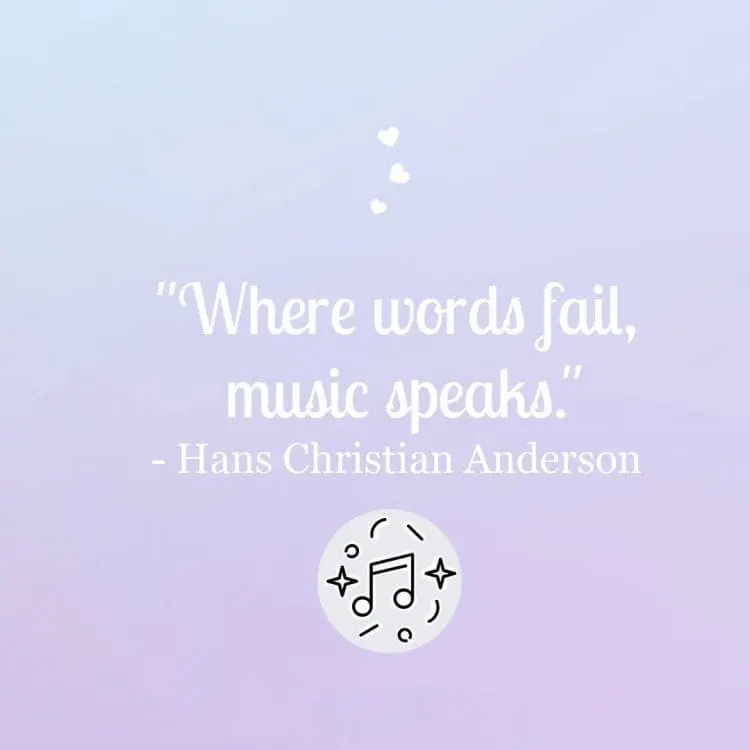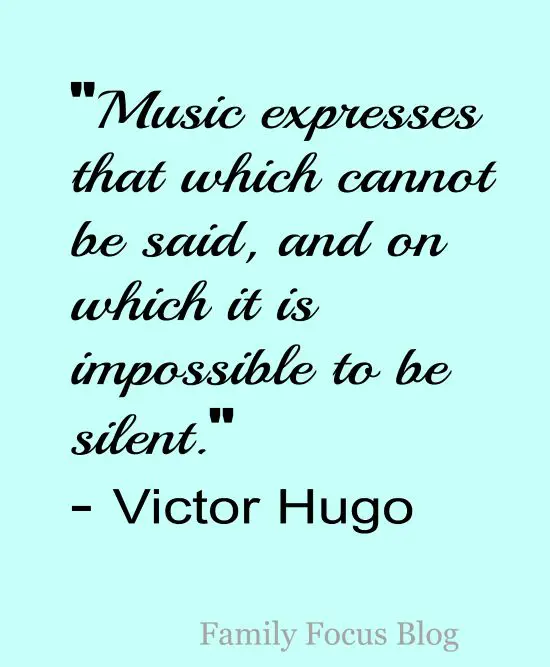Have you ever wanted to learn more about music therapy for kids? Well today I have, Carrie Friddell MT-BC, a Board Certified Music Therapist to tell us more about what music therapy is and how it is helpful for kids. She works with children with special needs in her clinical music therapy practice, In Harmony Music of Middle Tennessee. Carrie also is a Music Together center director and teacher and has taught piano for 20 years. She is also a mother of two lively school age children so she has a great understanding of children and how music therapy can be helpful to their development. I have also included a few inspirational music quotes.
“Music expresses that which cannot be said, and on which it is impossible to be silent.” – Victor Hugo
What Is Music Therapy?
The phrase I hear the most from parents of the children with special needs I work with is, “I believe there is a connection my child has with music, I was thinking that music therapy might be a good fit.” The very next comment is, “How does music therapy work, exactly?”
As a board certified music therapist, I have engaged in academic studies, practicum learning, taken a 6 month internship, and engage in continuing education activities to help navigate this one question. “What is music therapy?” It’s a great question that I love to answer!
Music therapy simply stated is the prescribed use of music and music techniques by a board certified music therapist to help a person achieve their unique non-musical goals. As RN, Tere Jones, says, “For children, music can be a fun way to learn, relax and get through tough emotional or physical situations. It can help with communication, social skills and with other abilities. In fact, it’s also been shown to reduce stress”.
Music therapy can enhance cognitive abilities such as memory, attention, and problem-solving. Engaging with different aspects of music, such as melody, rhythm, and harmony, can stimulate various areas of the brain. Music has the ability to affect the autonomic nervous system, leading to relaxation and stress reduction. Calming and soothing music can be used to create a supportive and comforting environment for children.
Possible Benefits Of Music Therapy For Kids
In my work with children with special needs, some common non-musical goals that music therapy can help achieve include:
- Making appropriate requests either verbal or non-verbal
- Making and maintaining eye contact
- Increasing social awareness
- Taking turns
- Using fingers to increase small motor skills
- Using arms and legs to increase gross motor skills
- Answer questions
- Increase focus and decrease hyper-active behavior
I use other instruments similarly, teaching piano or guitar skills, can help cover the above goals. What sets a music therapist apart from a music educator is that through training, I can make assessments, create therapeutic goals and objectives, plan out the course of therapy, implement therapeutic techniques, document progress, and generate reports. This gives a clear view of progress. Training in behavioral health, mental health, and physical health sets a music therapist apart. Music as therapy is used in the process of health and not always the end result of musical performance as the goal for formal music education.
Music has a connection with children because humans are musical beings. Babies wiggle their bodies to music and often coo and chatter after they hear singing. Toddlers, bounce and smile to the rhythm of a fun, energetic song. Preschoolers, sing favorite lyrics over and over again practicing their voices. Children are drawn to catchy tunes in movies and TV shows. Even grown-ups have their favorite music they like to listen to because it makes them feel good or resonates with a situation they have gone through.
Music provides a non-verbal outlet for emotional expression. Children may find it easier to express their feelings through music than through words, making it a valuable tool for emotional release and self-exploration. For children with speech and language disorders, music therapy can help improve communication skills. Singing, rhythm, and other musical elements can enhance language development and encourage verbal expression. Playing musical instruments and engaging in rhythmic activities can help improve gross and fine motor skills. It can be particularly beneficial for children with physical disabilities or those who need assistance with motor coordination.

Where words fail, music speaks – Hans Christian Anderson
Conclusion
Music therapy for kids is a therapeutic approach that utilizes the inherent qualities of music to achieve therapeutic goals. It involves the use of music and musical activities to address physical, emotional, cognitive, and social needs in children. Music therapy can be beneficial for kids with a variety of conditions, including but not limited to autism spectrum disorders, developmental delays, speech and language disorders, emotional and behavioral issues, and physical disabilities.
It’s important to note that music therapy is individualized, and interventions are tailored to meet the specific needs and abilities of each child. Certified music therapists work with children in various settings, including schools, hospitals, clinics, and community centers. If you’re considering music therapy for a child, it’s advisable to consult with a qualified music therapist who can assess the child’s needs and design an appropriate intervention plan.
Using music in throughout your child’s day can be a great motivator in their daily life as they grow and learn. Attending music therapy sessions can also be the key that helps unlock their potential and motivate their will. What songs and/or instruments motivates your child? Makes them wiggle, move, look up and smile?
Do you have any other questions about music therapy for kids? Share them on social media @familyfocusblog to open up discussion on music therapy.
Related Posts:
Red Light Therapy Benefits & Devices – A Healthy Lifestyle Choice


Danielle says
Music therapy sounds like it can really help kids who need it. Sometimes it’s just easier to connect with music, even as an adult. It’s great that kids are benefiting from this.
Kathy says
I’ve never heard of music therapy before. What an interesting post. It’s very nice to see something like this. I love when kids can pick up on music. I certainly hope that my daughters pick up an instrument someday in school and start to play.
LauraOinAK says
What a great article shining light on what music therapy is and how it is applied for kids. I totally love that quote about music expressing what words fail to say. So very true.
Jenny says
We actually did music therapy with both my kids. Both were non vocal and my son had other delays and it worked great. My daughter to this day still sings songs from therapy 2 years later.
Tiffany Cruz says
Last year party of my son’s speech therapy was done with music therapy.
Brandy says
My middle son goes to OT (occupational therapy) and they assigned music therapy to test for a bit, I think it helped him when he was overwhelmed. I would sit him down with that music on and within 20 minutes he was calm!
Manju Hariharan says
Totally agree that music is healing therapy. Achieving success in musical activities, whether it’s learning to play an instrument or participating in a group performance, can boost a child’s self-esteem and confidence.